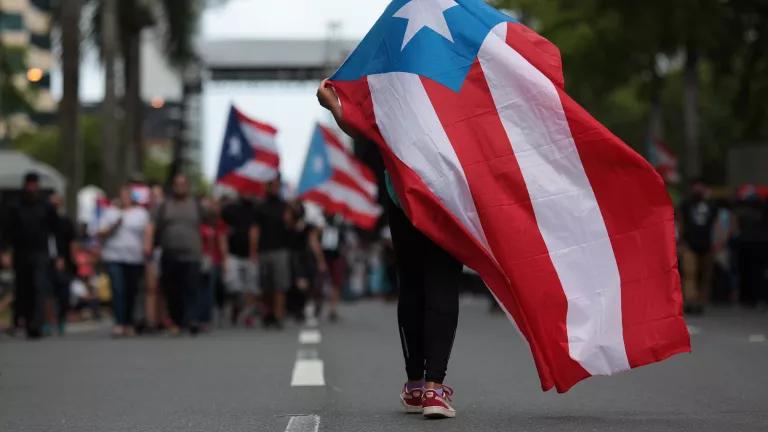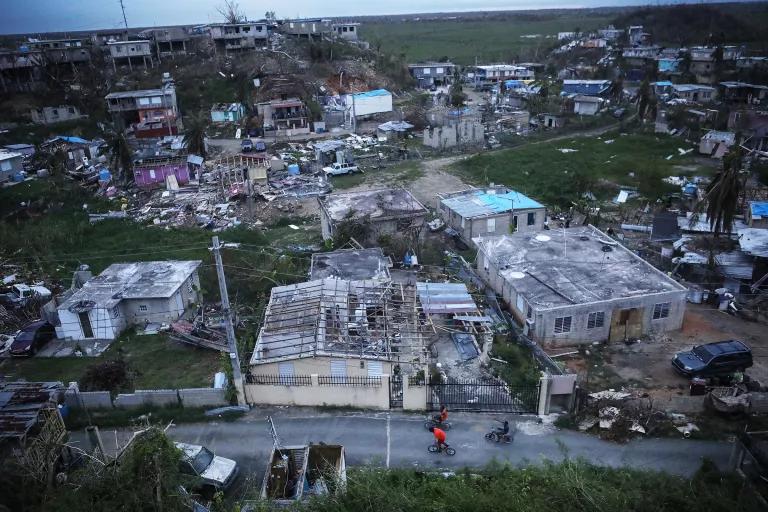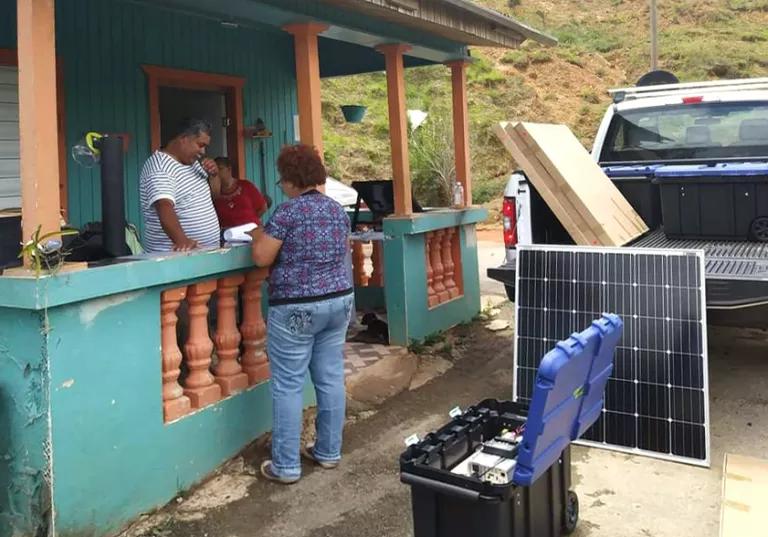Life, Liberty, and the Pursuit of Solar Power After Hurricane María
We, the colonized of Puerto Rico, declare our inalienable rights to self-determination and survival.

Protesters in San Juan, Puerto Rico, demonstrate against the Fiscal Control Board’s austerity measures, May 1, 2017.
After Hurricane María tore through Puerto Rico in 2017 and during the botched relief efforts by the Trump administration and our local government, we Puerto Ricans, at home and abroad, stepped up to take care of our own. Community kitchens and small-scale organic farms sprang up. Retirees restored electricity, doctors chartered planes full of medical equipment, everyday people smuggled in solar light bulbs, and neighbors rebuilt their local roads and bridges.
The storm’s aftermath exposed Puerto Rico’s status as the world’s oldest colony and all the dysfunction and disempowerment that comes with it. Millions went without proper shelter, running water, food, medical supplies, or electricity for up to 11 months, falling through the cracks of a U.S. system designed to discriminate against its possessions, its “territories.” Within the operations of the local government, we recognized the signature brand of corruption imported from the United States and held our breath in anticipation of the overdue political change that this international embarrassment would certainly bring.
Yet three years and one ousted governor later, we’re still under the same local administration, still under a colonial board that calls the shots, and still plagued by the same feeble electric grid María so easily shredded to pieces. When there’s no rationing from our still-undredged water reservoirs, there’s no water pressure. Blackouts and brownouts in water service remain commonplace.
Meanwhile, outsiders from the United States buy foreclosed homes at bargain prices, convert their properties to solar, build their own water collection systems, and flee to their primary homes for hurricane season. We are left here, collectively deprived of agency. That is the abusive essence of colonialism.
Radio Silence
I was in New York City when Hurricane María swirled toward Puerto Rico. When I called home on Tuesday, September 19, I told my parents I’d touch base with them on Thursday, once phone service was operational again. Then there was radio silence. For days.
The next morning I watched the radar in shock as the monstrous storm swallowed my entire country and remained practically stationary for eight hours. María took out most telephone poles and cell phone towers. Every single transmission line went down.
As a kid I had lived through Hurricane Hugo, which destroyed my parents’ law offices in Humacao. In high school I had taken cover from Hurricane Georges, a category 4 storm that spawned random tornadoes—unheard of in Puerto Rico. As an adult, I had attempted to fly into New York City from Berlin to prepare my Manhattan apartment for Hurricane Sandy, but the storm was so large there was nowhere on the East Coast my plane could land. So, by 2017, I thought I had seen it all.

Then images of Hurricane María began coming in from the U.S. media. It looked like a bomb had gone off—everywhere. The Puerto Rico where I grew up was no more.
At the time, my parents were living with my 98-year-old grandmother. I scrambled to establish contact. Finally, four days after the storm, one of my many pleas for help to random Puerto Ricans online resulted in someone going to my parents’ home. This kind soul recorded and somehow sent a short video of my mom letting me know they were all okay. Tears finally came. Relief. And then I thought, This is it. This is how we get things done. People helping people.
From the Ground Up
Faced with the vast incompetence of our local government, the habitual apathy of the United States, and the concerted corruption of both, we Puerto Ricans did what we could.
I found out what people needed and got it to them through a network of friends of friends working throughout Puerto Rico. The U.S. Postal Service in Puerto Rico was useless, so we dealt with UPS and FedEx, which shamelessly charged us “international rates” to deliver to what is technically “American soil.” Colonialism.
Leptospirosis outbreaks followed. In the wake of a storm it is common for people to mop their houses with water from street gutters, for laundry to be done in nearby creeks, and for children to play in the currents running along the roads. But Hurricane María had caused widespread mudslides that buried animals—wildlife and livestock—alive, and the combination of floodwaters and contaminated soil led to these potentially fatal bacterial infections. Drinking-water supplies, already scant, were also at risk.
The U.S. government bungled the distribution of water filters, sterilizing tablets, and even its “solution” of choice—bottled water (an inefficient option that leads to massive amounts of plastic waste and requires people to keep coming back for more).

So I launched the Clean Water Initiative, a small, grassroots effort to provide aid to remote locations. We raised funds for supplies and mailed LifeStraw products and disinfecting tablets to individuals who would distribute them door-to-door. When the shipments grew too large, we sent them via cargo plane to Base Muñiz by Luis Muñoz Marín International Airport, where dedicated volunteers waited under the brutal sun for hours to pick them up.
Power Dynamics
Two months went by, and, without electricity, my family struggled with mundane things, like keeping fresh food in the house. I bought them a small solar generator from Be Prepared Solar—the kind typically used for camping, with enough capacity to power a small fridge, a fan, and a light bulb. I was shocked to see how well the generator worked, even on overcast days.
The grid’s extended dysfunction was jeopardizing the survival of people who needed to keep medical equipment (like respirators) running and medications (like insulin) cold. Generator theft became a problem, and gasoline—which must be shipped from the United States—was prohibitively expensive.
So I reached out to the well-established grassroots organization Casa Pueblo in the town of Adjuntas. The group agreed to receive 13 of the same solar generator that we had bought and to use their personnel, already in place, to create a lending program for the community. Workers would install a generator at a home, and once electricity was restored, they would take it to another household that needed it. Those same solar generators are still making the rounds today.

Featured in the 2018 National Geographic documentary Paris to Pittsburgh, Casa Pueblo has long led the effort to convert the country to solar energy. Powered by the sun, its headquarters and movie theater became community oases during the post-María reality. So why has Puerto Rico, a place blessed with abundant sunshine, been generating nearly all its energy from fossil fuels?
Once the old grid was destroyed, it was the perfect time to act. Many solar experts, including Queremos Sol, drew up proposals outlining the viability and affordability of converting our outdated electric infrastructure into independent microgrids. These smaller but interconnected grids would continue to work should one fail and would be able to send power to a neighboring area when necessary. Most important, they could foster the growth of clean power industries and energy independence in Puerto Rico.
No more purchasing petroleum, natural gas, or liquified natural gas. No more waiting for tankers. No more proposals for dangerous undersea pipelines or terrestrial pipelines that would bisect the main island, cutting through fragile ecosystems in the central mountains and endangering our aquifers.
But the lure of U.S. fossil fuels still looms. Even the Puerto Rico Energy Public Policy Act—which passed last year and pledged that Puerto Rico would generate 100 percent of its electricity from renewables before mid century—contains questionable language around building billions of dollars’ worth of “temporary” infrastructure to import liquified natural gas from the United States. The legislation also fails to address the immediate needs of our most storm-vulnerable communities (which would be simple solar installations), could lead to even higher electric bills (which are already two to three times what U.S. residents pay), and doesn’t prioritize contracts for Puerto Rico’s own clean energy companies. (Also thwarting the progress of local businesses are Trump’s tax reforms that place higher tax burdens on Puerto Rico’s “foreign corporations.”)
And while recent moves by the Energy Bureau to support solar infrastructure and battery storage over new natural gas facilities seem headed in the right direction, their ultimate fate still lies in the hands of the Fiscal Control Board, created by the U.S. Congress in 2016. The board’s job is basically to recover as much money as possible from Puerto Rican public funds and funnel it back to the United States.
This is colonialism. Public policy safeguarding kickbacks that depend on deals made to purchase from the Empire, hire from the Empire. A colonial board in power to approve those policies. The upholding, above all, of dependence. It’s a feature of the design. We, the colonized, have no right to prosper on our own, to decide for our own.
This NRDC.org story is available for online republication by news media outlets or nonprofits under these conditions: The writer(s) must be credited with a byline; you must note prominently that the story was originally published by NRDC.org and link to the original; the story cannot be edited (beyond simple things such as grammar); you can’t resell the story in any form or grant republishing rights to other outlets; you can’t republish our material wholesale or automatically—you need to select stories individually; you can’t republish the photos or graphics on our site without specific permission; you should drop us a note to let us know when you’ve used one of our stories.

Mutual Aid and Disaster Justice: “We Keep Us Safe”
What Are the Effects of Climate Change?
COP27: The Issues, the Tensions, and the Urgent Need for Unity on Climate